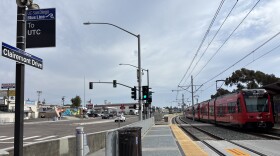The world has a new gambling capital, and it's a long way from Las Vegas. For the first time last year, the Chinese territory of Macau took in more money from gaming than the Vegas strip.
The former Portuguese colony is experiencing an economic boom as American companies rush in to open new hotels and casinos. But some observers are already wondering how long the gold rush can last.
The slot machines at Macau's Grand Lisboa casino are adorned with figures from Journey to the West and other Chinese literary classics. But the sound of a jackpot needs no translation.
The Grand Lisboa is the new flagship of Stanley Ho, the legendary 85-year-old billionaire who held a monopoly on gambling in Macau for 40 years until 2002.
Most of Ho's customers used to be hardcore gamblers, most of them men from neighboring Hong Kong. Supermarket owner Mao Jianhua, 31, is typical of the new breed of visitor to Macau. He's from mainland China, and he didn't come just to gamble.
"I'm just here for the fun of it, for entertainment," he said. "I'm not a big gambler. I just lost a little money today. It's now very convenient to come here from the mainland. A bus picks us up at the border and brings us here."
Changing Macau's Image
Last year, Macau's casinos raked in $6.95 billion in revenues, according to the Macau Gaming Inspection and Coordination Bureau. That's roughly $200 million more than Vegas.
The biggest newcomer is Las Vegas magnate Sheldon Adelson's $2.4 billion Venetian Macau. Twice the size of its Las Vegas namesake, the sprawling resort features 3,000 hotel rooms, a 1 million-square-foot convention center, a 15,000-seat arena and fake Venetian canals, complete with imported Italian gondoliers.
Venetian Macau's president, Marc Brown, says American gaming companies are changing Macau's image, which used to be synonymous with hardcore gambling and organized crime.
"If you didn't gamble, you didn't come to Macau," Brown said of the old era. "Why would you? I mean, basically, Hong Kong has great restaurants, great hotels, great spas, great shopping. That's what we created here. And you can spend a very enjoyable few days here and not set foot in a casino."
Of course, gambling still accounts for 80 percent of Macau's economic activity. And 70 percent of the casinos' revenues come from high rollers, who bet tens of thousands of dollars a hand at baccarat tables in private VIP rooms.
Despite the influx of money, many Macau residents are far from content.
Corruption Charges and Protests
On May 1, workers took to the streets, protesting official corruption and the importation of illegal laborers.
Macau legislator Au Kam-san says the casino boom is fueling inequality, driving up property prices and forcing local companies out of business.
"The increase in Macau's average wage is because there are more people with high incomes working in casinos," Au said. "It's not because poor people's wages have risen. Most people's wages have not risen, but prices have, and so their quality of life has declined."
Macau's government levies a 39 percent tax on the casinos' earnings. But they may be taking more under the table. Macau's former secretary for transport and public works went on trial this week, accused of taking huge bribes in exchange for expediting approval of construction projects.
Gambling with History?
Veteran local journalist Ricardo Pinto says Macau must not become a Las Vegas clone.
"Macau ... cannot become like a new Las Vegas with a strip with a lot of people making a lot of money, and then a downtown which is mostly moribund, almost dying," Pinto said. "Macau is not a place to do it, because Macau is not a desert, you know, it was not a desert, it's a place with hundreds of years of history."
Macau was a colony of Portugal for nearly four and a half centuries before returning to Chinese sovereignty in 1999. The city's old center remains a picturesque mix of cobbled streets, baroque churches and colonial forts.
In an antique shop near the ruins of St. Paul's church, merchant Liang Meiqing stands amid Buddhist statues and wooden furniture. She says the new casinos haven't helped her business a bit.
"Tourists these days are mostly mainlanders. They come to gamble, not to buy our antiques. It was better before China became so open. There were more foreigners who would buy our things," she said.
Au notes that Macau's economy was stagnant until Beijing made the decision to ease visa restrictions and allow more mainlanders to visit Macau. Au warns that if Beijing changes its mind about the policy, the casino boom could quickly go bust.
Copyright 2022 NPR. To see more, visit https://www.npr.org. 9(MDAzMjM2NDYzMDEyMzc1Njk5NjAxNzY3OQ001))







